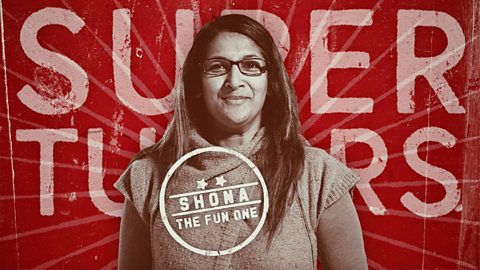
As parents, it’s easy to doubt whether we’re doing the right thing. This ‘parent guilt’ can leave us feeling like we’re not doing enough for our kids and somehow making decisions that will turn out to be the “wrong ones” in the future. Shona Goodall, aka ‘The Fun One’, is a clinical psychologist with a focus on parenting. She finds that a big concern for a lot of parents is the question around screen time for children on their devices – ‘How much time is the right amount of time?’ ‘What happens if they have too much?’ ‘What are the alternatives?’ Computers, tablets and phones are fantastic in so many ways. Children are getting to grips with skills they’ll likely need in later life and they are much more technologically advanced compared to us at their age. However, moderation really is key.
Shona offers practical solutions to help ease the guilt a lot of parents feel when they think their children are having too much screen time. Keep reading to find out how to tackle these thoughts and implement new ideas with your children.

Shona's tips
Play with your children
When you think your children have had enough screen time for a day, the best thing to do is to play with them. Play is fun and when we’re having fun, oxytocin (the happy hormone) is released. Play also sparks creativity and mental flexibility. It builds a stronger connection between you and your child and it stimulates building blocks of the brain like memory, self-control from waiting for your turn and regulating emotions. By playing with your children you are actually helping to wire the brain and make healthy brain connections.
Alternative relaxation methods
When everyone is tired, it’s hard to get creative. Relax with your child by watching films, reading a book or taking a long bath. Show them there are other hobbies and interests to enjoy other than being on their screens. This demonstrates first-hand how to relax their minds and bodies and emphasises the importance of it.
Give yourself a break
‘Parent guilt’ can get in the way of us making decisions and setting boundaries with our children, having some parent guilt is okay, it helps us to improve and reflect on how we might do things differently to make positive changes. However too much of these negative thoughts about our parenting skills can actually undermine us and erode away our own self-esteem.
Tone down your inner critic and tell yourself you are doing a good job by having a healthy growth mindset and using positive self-talk. A healthy ‘growth mindset’ is when we might say: “I can do this”, “This is hard but I just need to break it down and start small”, or even “Let’s have a break and come back to this later” When your children see this, it will help them know that nobody is perfect and it's possible they will adopt a similar mindset.

Activities to try at home
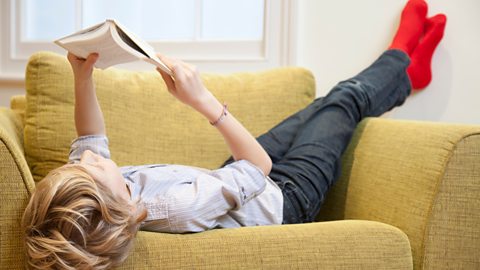
Have a read-a-thon
See how many books you can read in a month and keep track of your progress by making a tally chart.
Have a column on the chart for each family member and see who has read the most books at the end of the month. The winner gets a prize!
For extra points, write a mini book review after each read!
Play classic family board games
Board games are not only lots of fun but they stimulate areas in the brain that are responsible for memory formation, strategy, creativity and patience. The competitive nature of these classic games also make for a good laugh.
Board games are a fantastic way to get the family together and strengthen bonds whilst spending quality time with one another.
Musical chairs
What’s more fun than a hilarious game of musical chairs? This family favourite is great for children and adults alike.
Get your kids to pick their favourite tunes and pop them onto a ‘musical chairs playlist’.
Set chairs in a circle, one fewer than the number of people in the game.
Choose a designated DJ to play the music while everyone walks around the circle. When the DJ randomly pauses the music, everyone must try to sit on a chair as quickly as possible.
Whoever doesn’t get to a chair quick enough is out!
On each turn remove one of the chairs as a person is eliminated and at the end, crown whoever sits on the last chair as the winner!

Shona's film
Rosie: Have you got any ideas or activities that I could substitute some of Phoebe’s tablet time for activities that are going to motivate her, that are going to be educational, and she’s going to enjoy? Does that sound good?
Phoebe: Yes!
Shona: When we do decide they’ve had enough screentime for one day then our best ally for our children is play.A relaxed brain is a healthy brain and once relaced we are capable of so much more. This is because play builds a stronger connection between you and your child, a kind of relational security.
It’s fun and when we’re having fun oxytocin is released – you could call this our happy hormone. It sparks creativity and mental flexibility. It stimulates the building blocks of the brain like turn-taking. Lots of games involve some need for this which develops self-control as we are waiting for our go. Games usually involve memory in some way and practising regulating our emotions. By playing with your children you are actually helping to wire the brain and make healthy brain connections.
Here are my suggestions for a couple of games you could play to build brains…
Hide and seek – you can do this in the house hiding in different rooms, under beds, behind the door, and it promotes agility, concepts of volume, memory, self-control so they’re not speaking or moving and they’re really trying to keep still.
Voices: What time is it Mr Wolf? Two o clock.
Shona: What’s the time Mr Wolf? - You can do this anywhere in the house or garden if you have one. It builds patience and practising dealing with not knowing when you’re going to get chased. So, handling the excitement or nervous feeling we all get with uncertainty.
Voices: What time is it Mr Wolf? Dinnertime!
Shona: Memory games or cards that use memory - Create pairs that you lay out on the surface in front of your child and then take it in turns to turn over two cards at a time. You need to keep the cards if they match and if they don’t you turn them back over and the other person has a go. At this age, it keeps their interest if you challenge them to see if they can beat you.
And finally when energy is ebbing and everyone is tired, tiredness means its so much harder to feel creative, then the only way to pour from a cup is to get our cup filled so do things that fill your cup, have a bath, watch films, read a book you’ve been meaning to read. Show your children you have interests and hobbies showing them what matters to you and what you enjoy. This demonstrates first hand how to relax their minds and bodies and emphasizes the importance of it.

More from BBC Bitesize Parents' Toolkit…
Parents' Toolkit
Fun activities, real-life stories, wellbeing support and loads of helpful advice - we're here for you and your child.
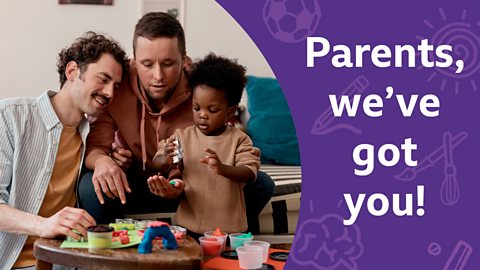
Teenagers - a good night's sleep
Anjula Mutanda talks about the struggle of helping teenagers get a good night sleep with conversation with Bez and son Arlo
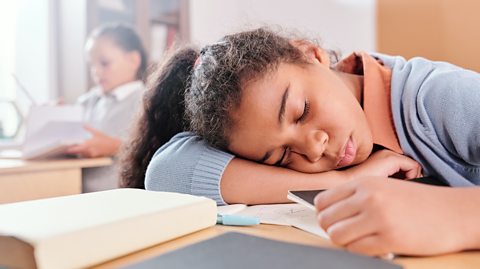
Michael Mosley: Five tips for helping your kids sleep well
Dr Michael Mosley offers advice on improving health and concentration through better sleep habits. Here are his tips for parents to help their kids.

The Super Tutors
Five experts in their field offer tips and advice to help you become a parenting master!
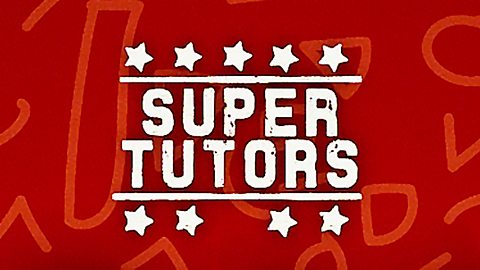
How do I get my child to sleep? - The Super Tutors
Dr Oscar Duke, aka 'The Doctor Dad', explains how you can help your child get into a good sleep routine.
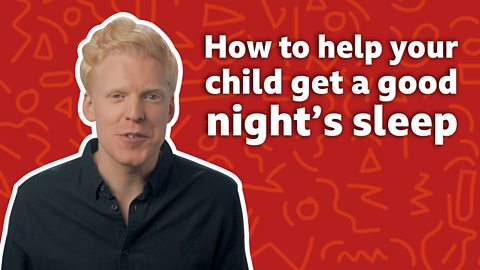
What's the best food for my child's brain, mind and mood? - The Super Tutors
Catherine Jeans, a.k.a. 'The Food Know-It-All', explains how food affects a child's sleep, learning and mood.
